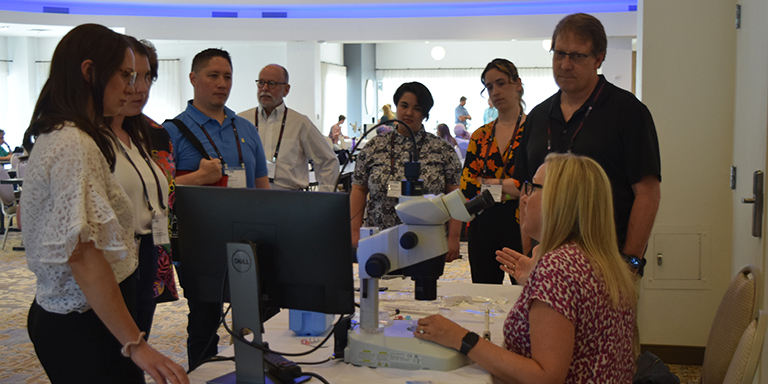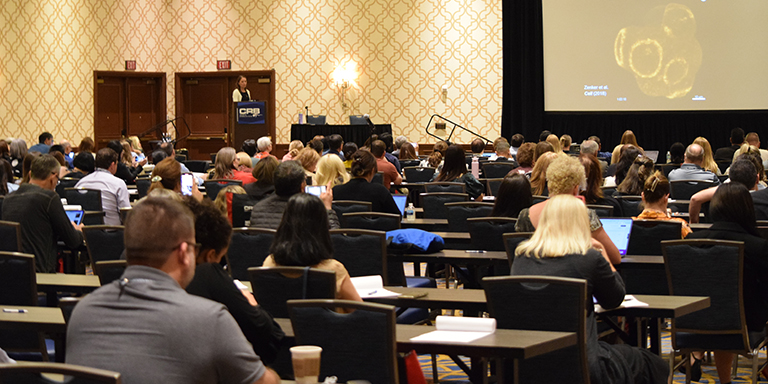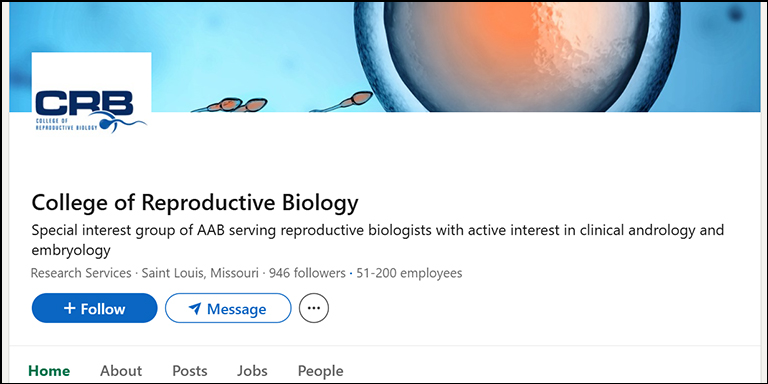
Newsletter
The College of Reproductive Biology (CRB) is a not-for-profit special interest group of the American Association of Bioanalysts (AAB).
California Recognizes Clinical Reproductive Biologists with the Passage of Senate Bill 1267
Salu Ribeiro, M.Sc., TS(ABB), ELS/ALS(AAB)
Nearly two years ago, we were thrilled to announce a significant milestone in the field of reproductive biology with the passage of California SB 1267. Although this landmark legislation was signed into law on September 22, 2022, and became effective on January 1, 2023, the California Department of Public Health (CDPH) finally began issuing licenses to laboratory personnel in the categories of Clinical Reproductive Biologist (laboratory director) and Clinical Reproductive Biologist Scientist (testing personnel) this year, thereby enhancing the professional standards recognition and visibility of professionals in our field.
Key Highlights of California SB 1267:
- Licensing and Regulation: The bill ensures that geneticists and reproductive biologists are now among the clinical laboratory personnel licensed and soon to be regulated by CDPH. This includes the collection of licensing fees and the issuance of clinical reproductive biologist and clinical reproductive biologist scientist licenses to qualified applicants.
- Personnel Requirements: It is important to note that this bill distinguishes the personnel requirements for Clinical Laboratory Improvement Amendments (CLIA) laboratories from tissue bank facilities, noting that tissue banks do not require personnel licensure at this time. This distinction is crucial for our members who operate or work within these varying environments. More information can be found here: https://www.cdph.ca.gov/Programs/OSPHLD/LFS/Pages/TissueBank.aspx
ASRM Guidelines for Embryologists in IVF Clinics:
In conjunction with this new legislative framework, it's essential for embryologists working in IVF clinics to follow updated ASRM guidelines. These guidelines emphasize the qualifications and duties of laboratory personnel, ensuring the highest standards of care and competence:
- Educational and Experience Requirements: Embryologists are required to have specific educational backgrounds and sufficient experience, including the performance of a minimum number of Assisted Reproductive Technology (ART) procedures.1
- Operational Standards: IVF clinics and laboratories must maintain rigorous quality management systems, ensuring the accuracy and safety of procedures. These systems are crucial for both patient safety and regulatory compliance.1
Moving Forward:
This is a pivotal time for reproductive health professionals in California SB 1267 not only recognizes our expertise but also promises to elevate the standards and practices within our profession. As we continue to navigate these changes, the CRB remains committed to providing our members with the guidance and support needed to excel under this new regulatory framework.
For more detailed information on SB 1267 and the guidelines for embryologists, please refer to the official documentation provided by the California Department of Public Health and the CRB's recent publications on laboratory management and operations.
Together, we are establishing new benchmarks in reproductive biology, enhancing the quality of care for patients across California and beyond.
Salustiano Ribeiro
- Practice Committees of the American Society for Reproductive Medicine & Society for Reproductive Biologists and Technologists. (2022). Comprehensive guidance for human embryology, andrology, and endocrinology laboratories: management and operations: a committee opinion. Fertility and Sterility, 117(6), 1183-1202. https://doi.org/10.1016/j.fertnstert.2022.02.016
CRB News Articles
07/18/2024
Vol 13, No. 1
07/18/2024
Introduction from the CRB President
07/18/2024
2024 CRB Symposium Recap
07/18/2024
Wishing Tammie Schalue a Happy, and Well-Deserved, Retirement
07/18/2024
Laboratory Management and Leadership Development Workshop
07/18/2024
Revolutionizing IVF Success: The Role of AI in Enhancing Key Performance Indicators
07/18/2024
CLIA Registration Fees are Increasing
07/18/2024
Recent CMS/CLIA Changes to Proficiency Testing Requirements
07/18/2024
FDA Imposes New Regulations on Laboratory Developed Tests
07/18/2024
2025 Symposium Dates & Location
07/18/2024
California Recognizes Clinical Reproductive Biologists with the Passage of Senate Bill 1267
07/18/2024
Earn ABB/PEER CE Credit by Attending ASRM!
07/18/2024
Andrology Antics by Samuel Prien, Ph.D., HCLD(ABB)
07/18/2024
A special thanks to the CRB Publication Committee members:
CRB Standing Rules - Log in to view



